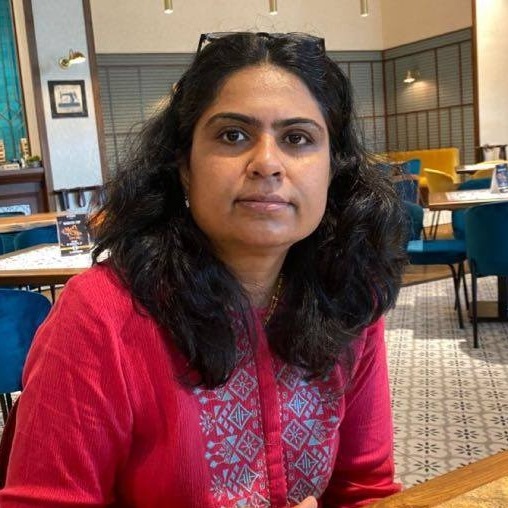For the nth time that day, the coach reminded again. Madam focus. The grip of the racquet is important. The thumb and the index finger need to come together in a circle. Only then can the energy from your shoulder, will flow freely to the racquet and the shots will get powerful. I absentmindedly nodded my head, but the body did what it was habituated to do. When I hit the next toss, of course the circle had to open and the fingers nowhere near each other. The toss went awry much like an errant child. If only I could make the shuttles listen, like how we made our husbands do.
I sat down, tired and annoyed at myself. At the other end of the playing arena, kids’ session was on. It was veritable treat to both eyes and ears. Shots flew around in gay abandon, hitting the shuttle was the object where it went was immaterial!! Swooshing racquets and pinging shuttles created a symphony of its own. practically created a musical symphony. The benevolent smiles of the coaches and parents alike said just one thing to me- KIDS always have it easy…
 Watching them have fun left me wondering Why do Adults find it harder to learn new things? Maybe because we always carry the baggage of existing knowledge. We know things or at least we think we know things. Badminton has been a part of my life but with the ebbs and flows of life it also has had its ups and downs. Today as I sat pondering the poor toss, I came to the realisation that its harder to unlearn than to learn. It was tougher for me to unlearn my original grip and imbibe the “right” style that this coach was trying teaching me. As with my meanderings, it made me wonder Does the same hold true for communication too?
Watching them have fun left me wondering Why do Adults find it harder to learn new things? Maybe because we always carry the baggage of existing knowledge. We know things or at least we think we know things. Badminton has been a part of my life but with the ebbs and flows of life it also has had its ups and downs. Today as I sat pondering the poor toss, I came to the realisation that its harder to unlearn than to learn. It was tougher for me to unlearn my original grip and imbibe the “right” style that this coach was trying teaching me. As with my meanderings, it made me wonder Does the same hold true for communication too?
A simple google search will tell us that communication is all about imparting or exchanging information by speaking, writing, or using some other medium. The key words to focus on are “imparting” and “exchanging” both these words indicate there has to be recipient who needs to react to the message being sent for any exchange to happen. To accomplish the goal the recipient must play his part of listening. Listening here being to receive the communication in its fullness irrespective of the medium
But think -is there any true exchange of information happening when one is not truly or actively listening. More often than not, we are listening not to understand, but to reply. Usually, we are burdened by the weight of our own expectations, our own judgements. Even before we completely hear the other party out, the mind begins to formulate a response or worse jump to conclusion, rather than purely listen.
Now this does two things. One, it reduces the speed and capacity to completely listen and imbibe, Two, it creates a confusion in the mind of the listener while analyzing the true impact of the content. Multitasking is a myth. One cannot do justice to more than a single activity at a single point in time. One is either fairly listening or processing. But cannot be effectively doing both at the same time. And the result, all the inner noises of our own prior knowledge and external noises in these online times, create a chaos in our head. Not exactly a favorable situation is it?
Coming back to my badminton classes -to my credit, being regular to the class had helped. Since I have to consciously move around the grip to shift between the forehands and backhands, the speed has reduced, but I am happy I am in the right direction and learning the right way and I can see the visible change in the power of my shots. I recently took part in my first tournament; well, I must say we did fairly well for a pair of beginners. But that is not the point. The point is -I had to consciously clear my existing way of doing things before I could even begin doing things the right way. I needed an open mind, a key step in active listening. Absorbed in my own knowledge, I was unable to completely listen to what the coach tried to convey and, in the process, took time to act on his instructions. When there is loss of data at the listeners end, there is indeed no communication.
Now there are a lot of practical tips to improve active listening. It would require a separate article in itself. But suffice it to say to begin with FAQ
Get the right Focus– Focus on the message not the messenger
Actively listen i.e., ignore external noises and quell internal ones
Question not!! Accept the message, ruminate, and then ask questions if at all needed
FAQ will ensure you have fulfilled your end of the bargain in communication another day another time we shall talk about …
-By Pari Sagar








